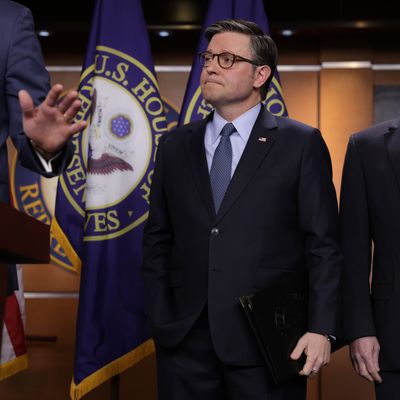
In 15 days, the House will elect a speaker to preside over the next Congress. Until the disastrous collapse of a stopgap spending deal needed to avoid a government shutdown at the hands of his own party’s president-elect, Speaker Mike Johnson was assumed to have a definite if shaky grip on the gavel. Yes, there was regular grumbling in the ranks about his leadership, particularly from the hard-core zealots of the Freedom Caucus, to whom Johnson owed his position after some of its members engineered the defenestration of former speaker Kevin McCarthy. But he managed through regular groveling to remain on the good side of party boss Donald Trump, and got some credit for the GOP retaining control of the House in the 2024 elections, albeit while losing one net seat.
Most importantly, few Republicans had a stomach for going through the ordeal that preceded McCarthy’s rise and fall in 2023, when any given handful of House members could veto a prospect for the speakership and every aspirant had shortcomings. Better stick with the devil they knew in Johnson than go down that perilous road with an even smaller majority than before.
But now the fiasco has called into question Trump’s faith in Johnson and created even bigger doubts about his ability to deal with the big fiscal issues facing the country. It’s unclear how or whether he can comply with Trump’s new demand that Republicans enact a stopgap spending bill without the sweeteners that made Democrats and some Republicans willing to vote for it, which includes a debt-limit increase. Increasing the debt limit has long been an abhorrent idea to most conservative Republicans unless it’s accompanied by deep cuts in non-defense spending. It is necessary to head off a default on government obligations next spring. Getting every single Republican to sign on will be hard but almost certainly necessary: Why should Democrats, including the Senate majority leader and the sitting president, abandon their own deal with Johnson and make concessions to save Republicans from this self-generated crisis?
The job of being speaker won’t necessarily get much easier in January, even assuming there’s a solution to the stopgap spending issue either in hand or in sight. Trump’s legislative agenda will depend very strictly on being able to get big packages of controversial legislation through Congress, quite possibly beginning immediately after the incoming president’s inauguration. Republicans will have at best a 220-215 margin in the House, and that will be more like 218-215 initially thanks to vacancies created by members resigning to take jobs in the Trump administration. Can Johnson be trusted to manage that task after the latest disaster? And indeed, will the votes be there to elect him speaker in the best-case scenario?
The Washington Post explains the dire arithmetic of the speaker’s election:
Johnson’s return as speaker was already somewhat up in the air after a number of conflicts with his conference earlier this year. Then his party lost a seat in the 2024 elections, meaning Republicans will have an even smaller majority — the second-smallest in history, actually. Then Representative Matt Gaetz (Florida) resigned and Representative Victoria Spartz (Indiana) said she would no longer caucus with Republicans (while remaining a registered Republican).
Add it all up, and the GOP’s majority will start the new Congress at either 219-215 or 218-215, depending on how you count Spartz. It takes 218 for a majority, and speakers must be elected with a majority of the House’s voting members — not just a plurality. So either way, that margin for Johnson is alarmingly thin.
That means that if no Democrats vote for him for speaker, Johnson can afford to lose the vote of only one Republican and keep the gavel.
Herding that many Republican cats seems implausible unless the 47th president goes to the mats for Johnson, and that in turn means Johnson would have to deliver on the almost impossible demands Trump has made of him now (the president-elect not very helpfully told Fox News that Johnson would “easily remain speaker” if he gets the desired legislation enacted). Right now the main source of optimism for the speaker is that there probably won’t be any consensus on a successor, particularly in the short time frame ahead. For one thing, Congress won’t be able to conduct the now–famous January 6 vote to confirm the results of the 2024 election (with, ironically, Kamala Harris in the chair of a joint session) without an elected speaker to convene the new House. And for the moment, Johnson is the officially nominated candidate of the House Republican Caucus, though that designation seems increasingly imperiled.
So the days and weeks just ahead look like pure hell for Mike Johnson, and he may just decide to go back to being an obscure back-bencher without the cares of the world on his shoulders and an erratic and irascible president (not to mention his scary sidekick, Elon Musk) firing phone calls and social-media posts at him 24/7. Nobody would blame him for sparing himself this agony, though it’s likelier he’ll lose his gavel the old-fashioned way by being cast aside by his colleagues.





























